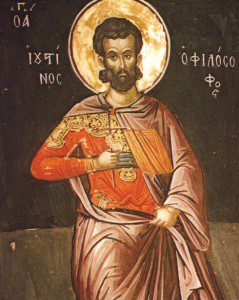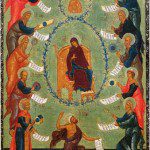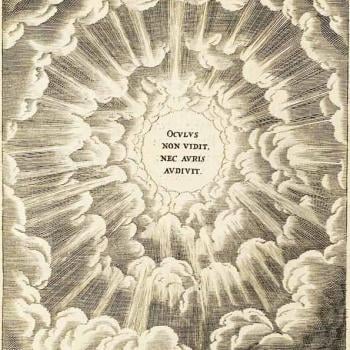Athenagoras, for example, declared that many of the questions Christians raised could be found coming from within the pagan tradition and yet were not treated with the contempt given to the Christians. “Poets and philosophers have not been voted atheists for inquiring concerning God.”[2] To demonstrate this, he quoted from Euripides and Sophocles, starting with Euripides, writing:
But speaking of Him who is apprehended by the understanding as matter of certain knowledge, he gives his opinion decidedly, and with intelligence, thus:—
“Do you see on high him who, with humid arms,
Clasps both the boundless ether and the earth?
Him reckon Zeus, and him regard as God.”For, as to these so-called gods, he neither saw any real existences, to which a name is usually assigned, underlying them (“Zeus,” for instance: “who Zeus is I know not, but by report”), nor that any names were given to realities which actually do exist (for of what use are names to those who have no real existences underlying them?); but Him he did see by means of His works, considering with an eye to things unseen the things which are manifest in air, in ether, on earth. Him therefore, from whom proceed all created things, and by whose Spirit they are governed, he concluded to be God; and Sophocles agrees with him, when he says:—
“There is one God, in truth there is but one,
Who made the heavens, and the broad earth beneath.”[Euripides is speaking] of the nature of God, which fills His works with beauty, and teaching both where God must be, and that He must be One.[3]

Certainly, the poets, for their excess, were seen to be inferior to the philosophers, who often were seen to be questioning what was expressed by the poets and yet were vindicated as being believers and not atheists. Even prophetic oracles, such as the Sibyls, were brought in and shown to be pointing to God, and so were also used in Christian defense of their faith in light of the charge of atheism held against them. St. Justin Martyr, who was willing to say the pagans could in a way be called atheists, bringing the argument of atheist back at them, nonetheless showed the common tradition and faith in the one God which can be found in the pagan tradition and the Christians. He used this to show how absurd it was to call Christians atheists when they shared with the greatest of the pagans not only a belief in God, but that such God reigns over all others; indeed, they even pointed out with the Christians that God would eventually bring an end to the world:
And the Sibyl and Hystaspes said that there should be a dissolution by God of things corruptible. And the philosophers called Stoics teach that even God Himself shall be resolved into fire, and they say that the world is to be formed anew by this revolution; but we understand that God, the Creator of all things, is superior to the things that are to be changed. If, therefore, on some points we teach the same things as the poets and philosophers whom you honour, and on other points are fuller and more divine in our teaching, and if we alone afford proof of what we assert, why are we unjustly hated more than all others? For while we say that all things have been produced and arranged into a world by God, we shall seem to utter the doctrine of Plato; and while we say that there will be a burning up of all, we shall seem to utter the doctrine of the Stoics: and while we affirm that the souls of the wicked, being endowed with sensation even after death, are punished, and that those of the good being delivered from punishment spend a blessed existence, we shall seem to say the same things as the poets and philosophers; and while we maintain that men ought not to worship the works of their hands, we say the very things which have been said by the comic poet Menander, and other similar writers, for they have declared that the workman is greater than the work.[4]
To believe in God, to believe in the monarchy of God, of one God over all others, required Christians to believe God has not kept to himself and to a certain few people and disregarded the rest of humanity. Such a belief was the assertion of the Gnostics, but not the Christians. Instead, there is a natural inclination to God, and so there were various kinds of revelation given by God to those who sought after the truth. Even if some who searched remained in error, and boasted of wisdom which they did not properly possess, even they were seen to constantly bring forth the truth about God. In this manner, St Clement of Alexandra stated:
For into all men whatever, especially those who are occupied with intellectual pursuits, a certain divine effluence has been instilled; wherefore, though reluctantly, they confess that God is one, indestructible, unbegotten, and that somewhere above in the tracts of heaven, in His own peculiar appropriate eminence, whence He surveys all things, He has an existence true and eternal.[5]
For unto all men was the truth of God made known, in one way or another, with seeds of the Logos spread across the world. This allowed for the truth of God to remain with all, so that even if that seed of truth was surrounded by error, God was able to be known by God and worshiped by all. To deny this was to see God not as God but as some particular and lesser divinity. To render due honor to God, there had to be the recognition of this universal worship of God, however erroneous and unworthy that worship might have been, allowing for Christians to point to it and show how they were presenting the same God all already knew while revealing truth of that God which they did not know.













